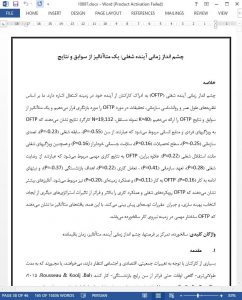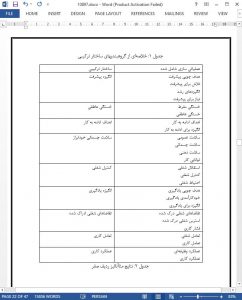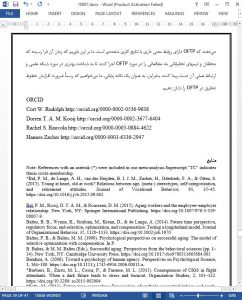Summary
Occupational future time perspective (OFTP) refers to employees' perceptions of their future in the employment context. Based on lifespan and organizational psychology theories, we review research on OFTP and offer a meta‐analysis of antecedents and outcomes of OFTP (K = 40 independent samples, N = 19,112 workers). Results show that OFTP is associated with individual characteristics and personal resources, including age (ρ = −0.55), job tenure (ρ = −0.23), organizational tenure (ρ = −0.25), educational level (ρ = 0.16), and self‐rated physical health (ρ = 0.16), as well as job characteristics, such as job autonomy (ρ = 0.22). Moreover, OFTP is related to important work outcomes, including job satisfaction (ρ = 0.28), organizational commitment (ρ = 0.41), work engagement (ρ = 0.22), retirement intentions (ρ = −0.37), and work continuance intentions (ρ = 0.16). OFTP is also related to task (ρ = 0.11) and contextual performance (ρ = 0.20). Additional analyses show that OFTP predicts job attitudes and work performance above and beyond the effects of another developmental regulation construct, selection, optimization, and compensation strategies. Overall, the findings of our meta‐analysis suggest that OFTP is an important construct in the context of an aging workforce.
1 INTRODUCTION
Due to demographic, economic, and societal changes, many employees expect, want, or have to work longer—sometimes even well beyond the traditional retirement age (Bal, Kooij, & Rousseau, 2015; Truxillo, Cadiz, & Hammer, 2015). Additionally, individuals are increasingly expected to take long‐term responsibility for managing their own careers (Gubler, Arnold, & Coombs, 2014). Research suggests that proactivity and adaptability are important for career success (e.g., Rudolph, Lavigne, Katz, & Zacher, 2017; Rudolph, Lavigne, & Zacher, 2017; Tornau & Frese, 2013). Proactive and adaptive behaviors require that employees adopt a long‐term perspective to anticipate and plan for their occupational future (Savickas, 1997; Strauss, Griffin, & Parker, 2012). One concept that captures this focus toward the future is occupational future time perspective (OFTP). Based upon research in the lifespan developmental literature (Carstensen, Isaacowitz, & Charles, 1999; Cate & John, 2007), Zacher and Frese (2009) defined OFTP as individuals' perceptions of their future in the employment context. They distinguished between two dimensions of OFTP (i.e., perceived remaining time and focus on opportunities) and showed that both were negatively related to employee age. The negative association between OFTP and age was replicated in several subsequent studies (e.g., Froehlich, Beausaert, & Segers, 2016). Moreover, empirical studies conducted over the past decade have demonstrated positive associations between OFTP and important work outcomes, including job satisfaction, work engagement, and work performance (Schmitt, Zacher, & de Lange, 2013; Weikamp & Göritz, 2016; Zacher, Heusner, Schmitz, Zwierzanska, & Frese, 2010).
9 CONCLUSION
This meta‐analysis examined antecedents and outcomes of OFTP, a temporal construct of increasing importance in the context of an aging workforce. In line with lifespan and organizational psychology theories, we found that age, as well as job and organizational tenure, are negatively associated with OFTP, and that educational level, self‐rated physical health, number of work hours, job complexity, and job autonomy are positively associated with OFTP. Moreover, OFTP had positive associations with important job attitudes, motivations, and well‐ being outcomes, such as work engagement and work continuance intentions, and with job performance outcomes, such as task performance. In addition, we found that OFTP predicted these outcomes above and beyond the effects of chronological age and SOC strategy use. Finally, we showed that OFTP partially mediated the associations between age and these outcomes when controlling for parallel effects of SOC. These findings demonstrate that OFTP is a unique developmental mechanism and emphasize the importance of OFTP in the work context.










